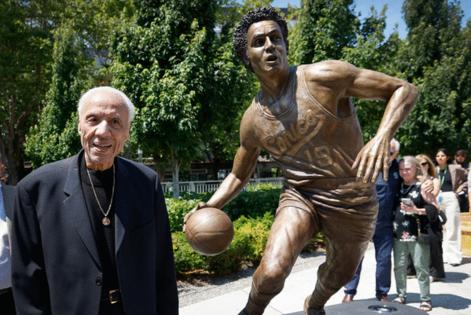Matt Calkins: Lenny Wilkens' remarkable Seattle legacy will resonate for years to come
Published in Basketball
SEATTLE — Brooklyn is what was on his birth certificate. Seattle is what was in his blood.
If you’re looking for a sports figure who exemplified the Emerald City, you’re not going to do better than Lenny Wilkens.
He spent 12 years playing and/or coaching here, and most of adult life as a fixture of the community. The Sonic legend whose statue stands outside Climate Pledge Arena embodied this town’s basketball scene and more.
The news of Wilkens dying at age 88 Sunday is the cause of heavy hearts throughout the Puget Sound region. Because for decades on end, the hoops Hall of Famer spent his time making those hearts full.
“He was a great soul. A kind man who knew how to quietly lead,” said Hall of Fame center and former Sonic Jack Sikma. “He set a standard with his kindness. The way he went about his life on and off the court is something you want your kids to emulate.”
Sikma also said that Wilkens’ career arc was “unparalleled” in the sports world, and it’s hard to argue against that. At one point, the former point guard was on a list of the NBA’s 50 greatest players and 10 greatest coaches.
He made nine All-Star teams during his playing days, including three in his four years with the Sonics. Then, he racked up 1,332 wins as a coach — the third most in league history.
Most would say that his chief accomplishment on the sideline was leading Seattle to its only championship in 1979. But former Sonic forward Wally Walker said a greater feat occurred one year earlier.
Twenty-two games into the 1977-78 season, after all, Wilkens took over a Sonics team that was 5-17. He ended up taking them to Game 7 of the NBA Finals.
Walker remembers Lenny’s first meeting with the players, when he told them he thought they could win. Wally started looking around the room, unsure if Wilkens was talking to them.
But he quickly convinced them of what they were capable of — not so much with X’s and O’s but rather sheer belief.
“He gave us confidence. This team had no confidence,” said Walker calling the ’77-78 season the greatest turnaround in sports history. “Just to give guys who were as low as you could without any confidence or belief — he gave us confidence and belief.”
So the Sonics ended up finishing 47-35 before falling to the Bullets in the Finals. They went 52-30 the next year before capturing the Larry O’Brien trophy.
Wilkens would go on to coach the Cavs, Hawks, Raptors and Knicks after parting ways with the Sonics in 1985. But those teams’ home cities were always temporary residences.
For decades, Lenny’s heart lay here in the 206. If there was a rally to bring the Sonics back, or a big name at Jamal Crawford’s summer pro-am league, Wilkens’ mug was probably there. He helped raised millions of dollars for the Odessa Brown Children’s Clinic in Rainier Valley as well.
But it wasn’t always the grand gestures that people remembered. Sometimes it was the little ones that nobody else knew about.
Fellow Hall of Famer Spencer Haywood played with/under Wilkens when Lenny was a player coach with the Sonics. But Wilkens’ actions on the court or sidelines aren’t what most resonate with Spencer.
In the early 1970s, Haywood was entrenched in a lawsuit he filed against the NBA that challenged a rule requiring players to be four years removed from high school before entering the league. He said that no player — Wilt Chamberlain, Jerry West, Bill Russell, etc. — had come to his defense. The only person backing Haywood at the time was Wilkens. Spencer essentially compared him to a guardian angel.
“When I cried at night because there was so much stress on me with the case, Lenny was there to hold my hand,” Haywood said. “He sort of saved my life.”
Last June, Wilkens was immortalized outside of Climate Pledge Arena with a statue. It marked the first time a basketball player had ever received such an honor.
Haywood joked that the sculpture mischaracterized Wilkens because it shows him driving right despite his reputation of always going left. But all posterity will see is the likeness of a man who lived his life moving in the proper direction.
Wilkens never realized his post-coaching dream of seeing the Sonics return to Seattle. Hopefully that day isn’t too far away.
In the meantime, this city mourns — and celebrates — the epitome of Seattle basketball. Wilkens is no longer with us, but he’s a long way from gone.
____
©2025 The Seattle Times. Visit seattletimes.com. Distributed by Tribune Content Agency, LLC.







Comments